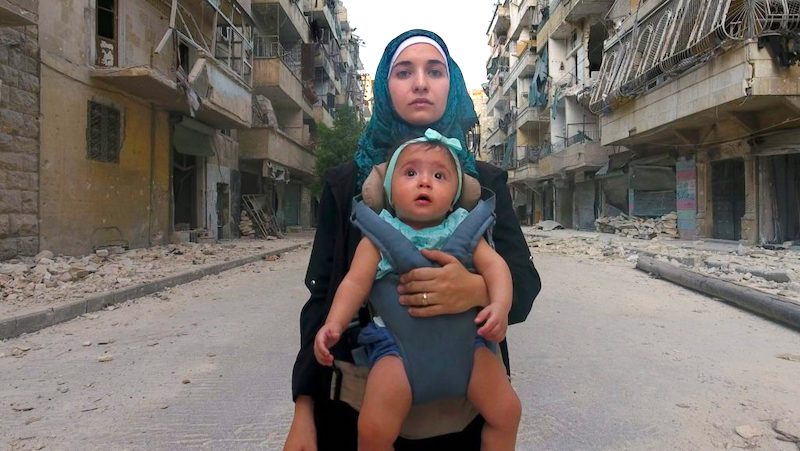
For Sama, the new documentary in theaters that chronicles the five years of the Syrian uprising in Aleppo, is presented as a document from a mother trying to explain what happened to her newborn daughter. Yet what filmmaker Waad Al-Kateab shows through capturing the minutiae of everyday life in a city under siege and continuous bombardment, is a love letter to people committed to building a better society even as the situation around them becomes dangerous. Al-Kateab, a journalist, and her husband Hamza, a doctor, make the choice several times to stay in Aleppo and continue their work while starting a family, building a life, helping their community, hoping they can sustain despite the circumstances. The film presents a narrative rarely seen on screen, intimately documenting life from inside a city ravaged by war, as its people are just trying to live through the days. We recently spoke to Al-Kateab and her British co-director Edward Watts in New York. (This interview has been edited and condensed for clarity.)
Murtada Elfadl: How did you come to work together?
Waad Al-Kateab: I worked on many reports from Aleppo that were broadcast on Channel Four News. They got a lot of views and were really good for them and for me. I remained in contact with them after we left Aleppo. We were nominated for awards in the UK, so they sent me a visa to come to London to attend the ceremony and meet them. We talked about the possibility of working together again. When they knew about the footage I had, they put in touch with Edward.
Edward Watts: I've made a lot of documentaries. I've been a documentary director for about 12 years. I was really passionate about Syria and for a long time I'd really wanted to make a film about people like Waad and Hamza who were secular, educated, middle class people who are basically just fighting for the values that we take for granted, and they are being met with this unrelenting violence. And for various reasons, none of those projects ever got off the ground. So when Channel 4 realized that Waad had this extraordinary archive, they wanted to make a film, but no one quite knew what shape it was, they felt I might be an appropriate collaborator to do justice to her amazing story
Al-Kateab: So we met, we had a long conversation first and then we watched everything I had and then started this long process.
So how was the division of labor between the two of you? How did you work together?
Al-Kateab: We come from different backgrounds, different areas. I've lived through this and he has great experience in this field. So really from the beginning it seemed like very good collaboration.
Watts: We were learning about each other, getting to know each other and building a friendship as well as a collaboration.
Al-Kateab: The first challenge was to build the trust between each other. It was not easy at all, especially in the beginning. I had just left Aleppo. Everything was new but gradually we came together.
Watts: At the beginning of the process Waad was in Turkey but even then we were always very involved in discussing with each other what the plan was. We'd put things together, show her, while having open communication. Then when she got asylum in the UK, we became wholly integrated in London basically, which was fantastic, and that was it.
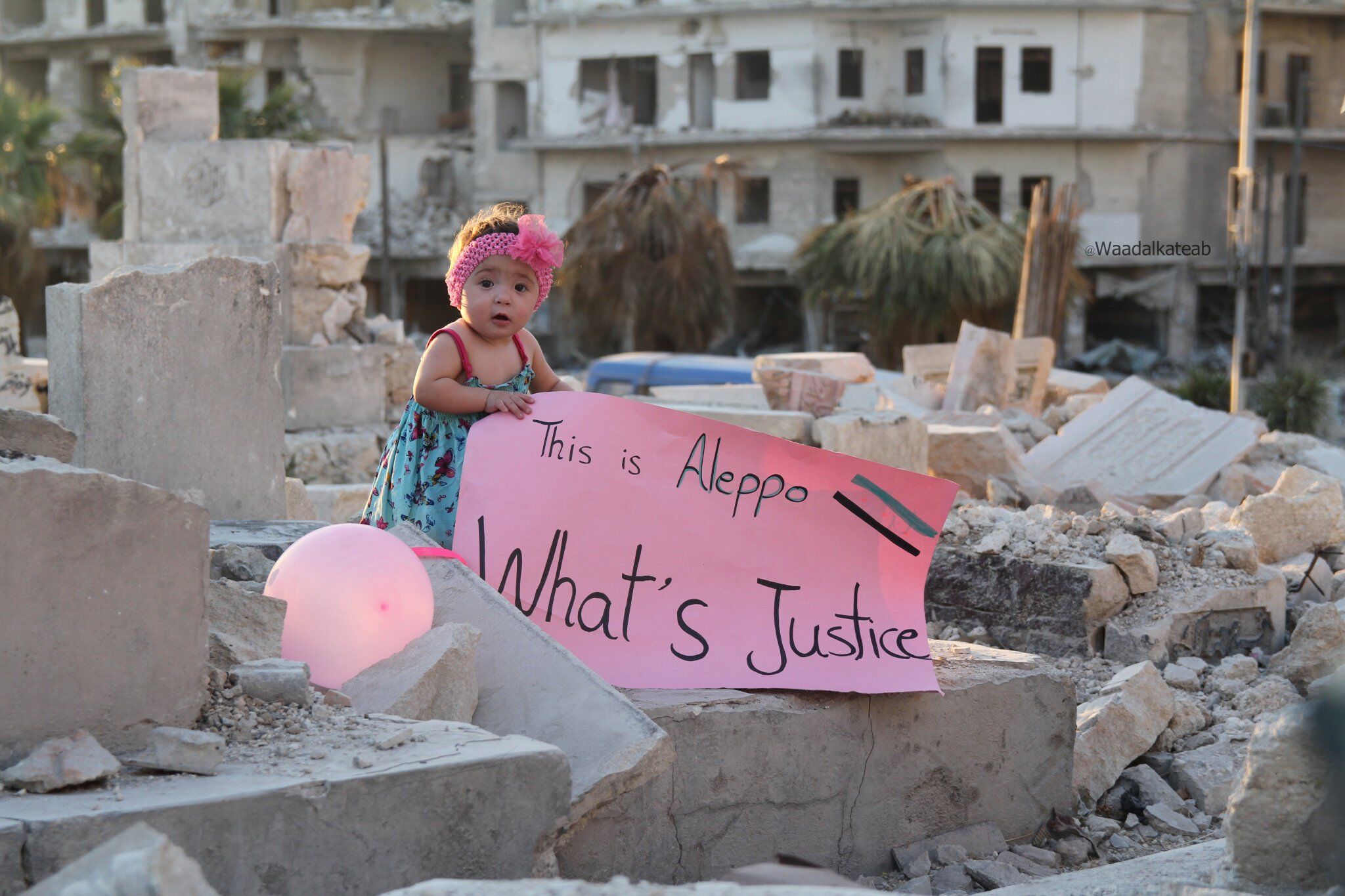
The film has a prevailing note of hope and resilience. Why was that important for you to show?
Al-Kateab: It was how I was feeling throughout the years of the siege. It was the most amazing thing. Since the revolution started and as the violence was gradually increasing, we were still hopeful. Not just me and Hamza, but everyone in the city, everyone in the hospital, everyone we met. We felt love and power because we were all together in the same situation. And when we left Aleppo and were looking back I realized that was how we survived. It was very clear and very obvious to everyone who saw the footage.
Watts: Yeah it was the truth. I think it's so often the case that media looks at conflict zones through the victims or perpetrators of violence. Whereas the reality is that the human spirit is so strong even in the face of all that. That's the truth of their lives.
Al-Kateab: You don't have to analyze it or look for it. It's very obvious for anyone who watches this.
Watts: if you tell the true story, then hope and resilience will come through. You don’t have to impose it.
It definitely comes through. In the press notes you mention your opposition to calling the conflict in Syria a civil war because of the outside forces that have played a part in crushing the revolution. That comes through in the film when you show the Russian shelling of Aleppo. What other socio political messages did you want the audience to get from this movie?
Al-Kateab: Unfortunately, we have to reiterate that message again and again even if it's clear. I will say it again because this is really about everything we've gone through, not just as Syrians but all over the world. Usually journalists try to be objective and neutral. When reporting on Syria or somewhere similar, you can't just say the hospital was bombed or people were killed. Who did this? You have to report that too.
Watts: It's not a natural disaster. A hurricane didn't blow in and blew up the hospital.
There are perpetrators.
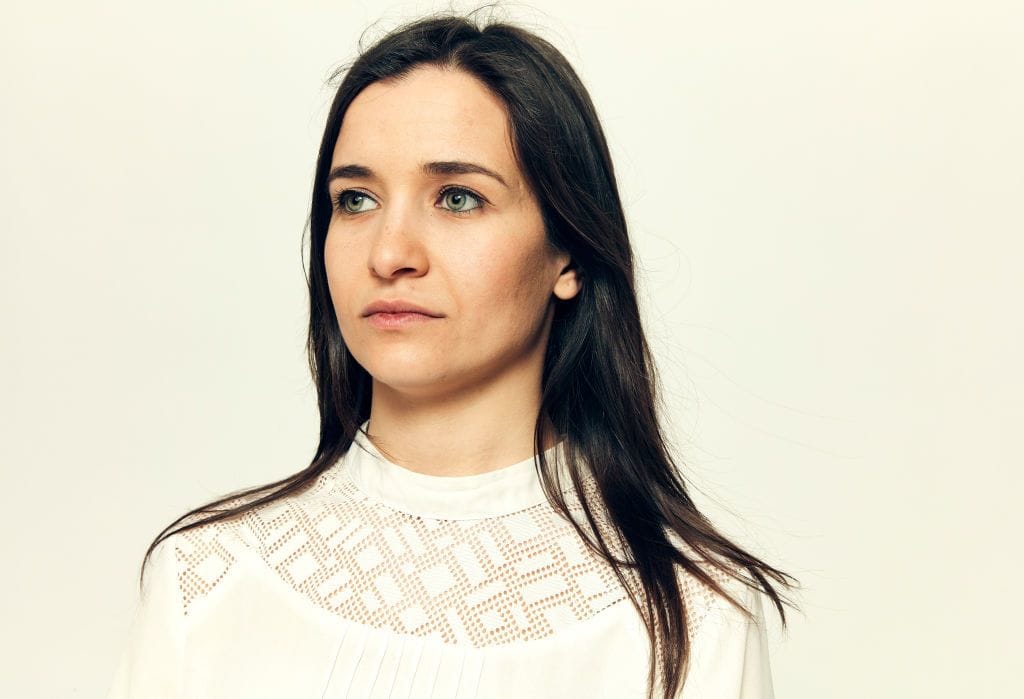 Waad Al-Kateab
Waad Al-Kateab
Al-Kateab: We've lost Aleppo, we've lost thousands of people. It's being presented that Assad's victory was because of terrorists and Isis. When in actuality the real battle is about the truth; who did this, why did it happen and how we let it happen. It's not a civil war, it's a revolution. And it was systemic. This is something that was planned to get this result.
In the end, one of the most important messages is about the refugees and why these people become refugees. It's not about just how many refugees are around the world, but why they were forced out. Something Hamza mentioned the other day, when we were young - us and a lot of people like us in Syria - our dream wasn't to be refugees in the UK in 2019. We wanted to stay in our homes. We fought to stay and even when we left it wasn't by choice.
And I wanted to show how females, women, mothers as human beings we can fight against anything if we really believe in something. How women are strong and powerful and can face anything in the world.
Watts: And also Idlib as well. What you see in the film was shot longer than three years ago, but it could have been a year ago when Ghouta, a part of Syria, suffered the same thing. And the same exact thing is happening now in Idlib in the northwest part of the county. The final thing to add is for the western audience, one of the things that I really wanted to convey, what we both wanted to convey is just to get people to say look at what we allowed to happen. Before our eyes, if you forgive me for saying ,our brothers and sisters, our fellow human beings suffered in this way. We can't say that we didn't know, we allowed this to happen and now we're all reaping the whirlwind of a world in which all of our values had been shattered. And so many of those values are shattered for the first time in Syria. And I just want people to reflect on what we allow to happen and think about it. We can't say to ourselves, well, it's a shame that's happening over there, but we're all right over here. We're all fundamentally connected and we have something at stake in what these people have been through.
You've been traveling with this film, showing it in different places. Do you think these messages are getting through to the audiences you're meeting and talking with?
Watts: Definitely.The first place we showed it was South by Southwest in Austin, we had no idea what the reaction would be. And what's been extraordinary is whether it be from Austin to Sheffield to Cannes, to Nantucket, to New York, all these places, it feels like we've had almost a united response. Everyone has responded with this passion and humanity.
Al-Kateab: And care. Different people, from different backgrounds, from the filmmaking industry, or just people from the street, all of them really care about what they see. And the great, amazing question, which we get in almost every screening is "what can we do?" This question means that people are not just moved or touched by this film, but they also want to do something. They want to transfer their sadness and anger into action. This is what we really need.
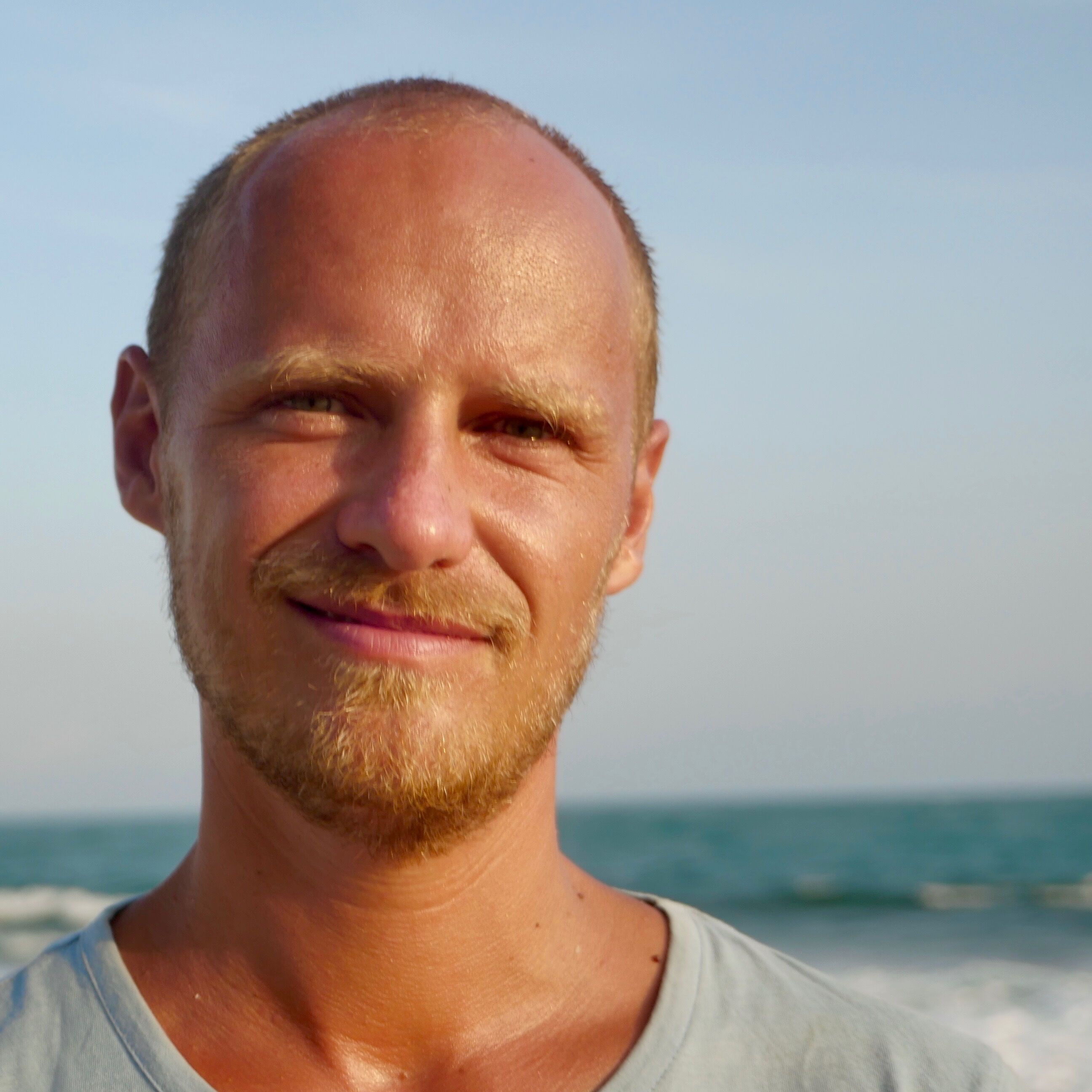 Edward Watts
Edward Watts
Watts: And there's a political element too. We're screening at the UN next week and Waad and Hamza are going to have an opportunity to do a briefing with various UN experts. We're also connecting on that level with people who have their own fatigue because they've been working on this for so long.
I read that because the part of Aleppo that you were in was conservative, you had access to the areas with women and children. Is that why it became a thesis of your film?
Al-Kateab:When I started, when I came to east Aleppo I had no idea what I wanted to film. I just felt that this is a new life. Everything was very new, very chaotic, very strange. Not just for me but even for the people who were already living there. So I was looking around to see what people's lives looked like. I was just filming that naturally, not as a female filmmaker. We had a lot of challenging situations about who we can film, why we are filming, what the point of filming is.Through five years of living in that place, being a woman, a pregnant woman, living with these families, I got their trust. My husband is a doctor so the people knew me because they knew Hamza. Any doctor, not just Hamza, they get a feeling of safety from them. They knew me as part of this community. I wasn't a journalist there for just one week. So they'd have a kind of respect for us, for why we stayed there. So these women were comfortable when they spoke to me, with the camera without the camera. Not like if it was a man speaking to them. They would see me as a pregnant woman living with them in this high risk situation, a trust develops.
My life is one example from thousands of other mothers and thousands of other women. The challenges that we faced, the crazy mad lives that we lived. One moment you feel that life can go away at any moment, and that makes it feel more valuable, worth more. Sometimes it doesn't matter when you've seen a lot of people dying at the same time. It's very complicated. I really can't explain the right feeling. It's just difficult.
The film is framed as a message for your daughter, Sama. That was probably not the intent when you started filming in Aleppo. Was that something that came through during the time you were working together? When did it weave into this a message?
Al-Kateab: When I was shooting in Aleppo I had no idea that I'm doing this for a film. So of course there was no plan at all. But naturally when I was filming I'm speaking to Sama. I am a mother, I'm speaking to my daughter and this is something all moms do all over the world. When they are pregnant, after they are born, they speak to their babies. And then when we started editing the film at the beginning we were trying to tell the story chrnologically…..
Watts: but it was massive and were trying to get a handle on it.
Al-Kateab: Two thirds into this process, we had that idea of making it for Sama. It worked because it was really for Sama.
Watts: Like she said the footage was infused with that spirit. But it almost took us some time of working through it and trying to work through the story before we could hear the footage talking to us and saying this is how I want to be. It just unlocked so many things and allowed us to access that fundamental Sophie's Choice at the heart of the film. What do you do when you're trying to protect your precious children and yet you're fighting for their future. And the two things seem to be almost in contradiction.
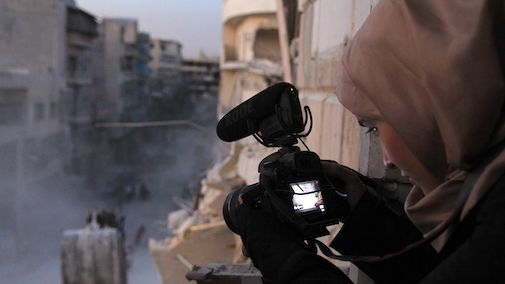
Al-Kateab:What I really want from my experience, first of all, before anything else, I wanted to understand what happened, I want my kids to understand.This is for Sama but also for all the children. Every child that was in Aleppo at that moment, every Syrian child around the world to know what was really happening in Syria. This is the last weapon we have; to tell the truth. Not the propaganda of the regime and not what Russia wants. Not about Western audience or local audience or anyone else seeing the story from their perspective. It's about what we saw, our story.
What are you hoping would happen after the film is released and seen by more people?
Al-Kateab: First thing, especially after the UN screening to bring attention to the bombing of hospitals and stop bombing people in Idlib. I don't want anyone else to have the same experience that we had. Especially all the mothers who are living now in Idlib, all of the people who are displaced from Aleppo, from Ghouta. What you saw in the film is happening now in Idlib. So the first thing I hope for is to make a difference on the ground. The UN people, the security council, decision makers around the world. They don't know the reality on the ground, how their decisions affect people. And I'm just giving them that chance. Most of them are parents or have lives similar to our lives but just in different circumstances. I hope if they see this film they see how people's lives can change based on the decisions they make.
Watts: One of the things that's amazing about this film is that it's almost an empathy machine, if I can say that. People are engaging with the humanity of the experience of being under this bombardment. Russian people, the people, not the government. They don't know what their government is up to. And there is this hope that if we can show it to people in Russia, if they see what's being done in their name. The Russian government as much as it's a dictatorship, is also susceptible to domestic pressure. We saw that over the pensions protest they did. And the great dream is that if we can connect with the Russian people in the way that the film has connected with other audiences. Maybe they'll pressure their government to say, no more. And if that happens, it's the Russians that have supported the regime. The regime wouldn't be there without the Russian support. And so our biggest dream is that chain reaction that as Waad says, actually makes a difference to people's lives.
FOR SAMA is out now in New York and LA.